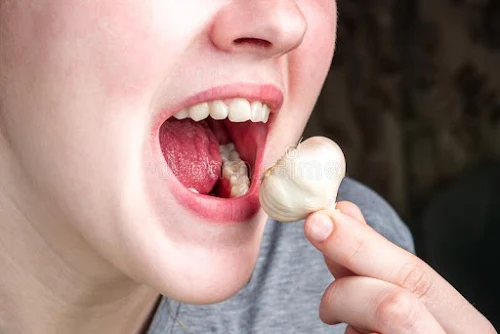4 Types of People Who Should Not Take Garlic Everyday
Garlic produces a chemical called allicin. This is what seems to make garlic work for certain conditions. Allicin also makes garlic smell. Some products are made "odorless" by aging the garlic, but this process can also change the effects of garlic.
People commonly use garlic for high blood pressure, high levels of cholesterol or other fats in the blood, and hardening of the arteries. It is also used for the common cold, osteoarthritis, and many other conditions.
Possibly Effective for:
- A painful uterine disorder (endometriosis). Taking garlic powder tablets by mouth daily for 3 months seems to improve pain in people with this condition.
- Hardening of the arteries (atherosclerosis). Taking garlic powder by mouth, alone or with other ingredients, seems to help slow the hardening of the arteries.
- Diabetes. Taking garlic powder by mouth seems to reduce pre-meal blood sugar levels by a small amount in people with or without diabetes. It seems to work best if it is taken for at least 3 months. It's unclear if garlic reduces post-meal blood sugar levels or HbA1c levels.
- High levels of cholesterol or other fats (lipids) in the blood (hyperlipidemia). Taking garlic by mouth daily for at least 8 weeks might reduce total cholesterol and low-density lipoprotein (LDL, "bad" cholesterol) in people with high cholesterol levels. But any benefit is probably small. And taking garlic doesn't help increase high-density lipoprotein (HDL, "good" cholesterol) or lower levels of other blood fats called triglycerides.
- High blood pressure. Taking garlic by mouth seems to reduce systolic blood pressure (the top number) by about 7-9 mmHg and diastolic blood pressure (the bottom number) by about 4-6 mmHg in people with high blood pressure.
- A build-up of fat in the liver in people who drink little or no alcohol (nonalcoholic fatty liver disease or NAFLD). Taking garlic powder by mouth seems to help to improve liver health in people with NAFLD. People who eat more garlic also seem to be less likely to be diagnosed with NAFLD.
- A serious gum infection (periodontitis). Taking aged garlic extract by mouth twice daily for 18 months can help improve gum health in people who have mild or moderate periodontitis.
ALSO SEE: Medicinal Benefits Of Garlic Skins
According to several studies, allicin, the active compound of garlic may have the same mechanism as blood pressure drugs. It’s believed that garlic can prevent the formation of angiotensin, II, a hormone and it can also relax the blood vessels. Moreover, it’s great for people who suffer from high levels of bad cholesterol because it has the power to control it.
Garlic is a tasty addition to a variety of dishes; however, as you read above, it has some pretty amazing health benefits as well. What’s more, if the garlic is homegrown, then you’re on the right track! According to a study, people who took garlic supplements daily lowered the risk of colds and flu by 63%. Garlic is also great against ear infections and stubborn staph infections.
However, in some people, when eaten raw, garlic may lead to bad breath, gas, nausea, strange body odor, heartburn, etc. Also, there are other groups of people that should be careful with their consumption of garlic. Let’s take a look:
1. It’s a natural anticoagulant; therefore it’s beneficial against circulatory problems by making the blood more fluid and thus, preventing blood clots that may lead to thrombosis, strokes, etc. But, be careful, when you use it in combination with anticoagulant medications, you can cause unnecessary speeding of the blood flow and eventual bleeding.
2. Garlic should not be consumed with medications because it may cause additional problems; therefore, consult your physician if you suffer from some condition or disease.
3. When excessively consumed, garlic and onions may damage the gastrointestinal tract and lead to discomfort
4. People who suffer from low blood pressure should eat garlic moderately because it may additionally lower blood pressure.
ALSO READ: 5 Powerful Reasons To Start Eating Garlic











